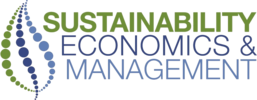Chairs and Working Groups
A large number of chairs are involved in the teaching of the degree programme, which actively deal with topics in the field of sustainability, climate, energy, etc. in their research.
Business studies: Ecological economics
(Prof. Dr. Bernd Siebenhuener)
Ecological economics deals with the question of how human action can be shaped within the limits and conditions of ecological systems. A holistic perspective is adopted in order to understand interactions between the economy, society and nature and to develop sustainable solutions. In a broader sense, the object of research in ecological economics are the interactions between natural and economic systems. It is concerned with concepts for recording and describing these interactions, with the conceptual formulation of sustainability and with pointing out possible solutions in the direction of sustainability.
Business Administration: Sustainability & Supply Chain Management
(Prof. Dr. Christian Busse)
The research field of sustainability-oriented production management is therefore concerned with the question of under what conditions companies are (or could be) induced to pursue more sustainable solutions and what such solutions look like. It is thus generally characterised by a field of tension between the normative basic orientation of the sustainability postulate and the empirically observable corporate action, as well as by an interesting dynamic between the two levels of analysis, company and system. We deal with problems that we consider to be particularly relevant from a social or managerial point of view, as well as with barriers that stand in the way of conducting relevant research.
Business studies: Management
(Prof. Dr. Jörn Hoppmann)
The aim of the chair's research is to investigate how companies and the individuals acting within them (can) contribute to a more ecologically and socially sustainable development. To achieve this research goal, our research focuses on topics at the interface of (1) strategic management, (2) sustainability and (3) innovation. Exemplary questions of our research are:
- How does the institutional environment of companies (especially regulatory incentives) influence strategic decisions and organisational learning (in a sustainability context)?
- Which internal organisational structures and governance mechanisms enable and promote strategic and organisational change towards sustainability?
- How do cognitive variables such as attention, framing and identity influence corporate sustainability strategies?
Business Administration: Marketing and Innovation
(Prof. Dr. Sascha Alavi)
The chair deals with conceptual - theoretical and empirical issues at the interface between marketing and society; sustainable development, macro-marketing, sustainability marketing, culturalist marketing and brand research.
Business Administration: Innovation Management and Sustainability
(Prof. Dr. Klaus Fichter)
The research work of the associate professorship Innovation Management & Sustainability focuses on theoretical questions of evolutionary economics and interaction economics as well as empirical and application-related aspects of innovation management, the generation of sustainability innovations and "green" future markets as well as environmentally oriented entrepreneurship (eco-entrepreneurship).
Law: Public law, European law, legal theory, information and telecommunications law
(Prof. Dr. Dr. Volker Boehme-Neßler)
We do not look at law in isolation. We see and analyse it in its interconnectedness with other sciences and with social reality. The focus is on economic, media, political and psychological aspects. But other sciences are also consulted without fear of contact when the research topic requires it.
Public law, European law, legal theory, information and telecommunications law
SoWi: Organisation & Innovation
(Prof. Dr. Jannika Mattes)
The professorship's working group focuses on innovation research.
We deal with social dynamics in sustainability transformations, especially in the field of energy. In addition, we investigate collaborative innovations in and between organisations. Our focus is on the cooperation of heterogeneous actors in organisations and regions, taking into account global linkages. We have expertise in transition research, innovation research, organisational sociology and economic geography.
Computer Science: Business Informatics/ Very Large Business Applications
(Prof. Dr.-Ing. habil. Jorge Marx-Gómez)
In research and teaching, we focus on large company-wide operational and inter-company information systems. The department also focuses on corporate environmental information systems (BUIS), business intelligence (BI) and big data. We work closely with the OFFIS e.V. Institute for Computer Science on issues and applications relating to data science, the Internet of Things and Industry 4.0 in various research projects in the energy and smart city context (e.g. NetzDatenStrom and enera).
Environmental Sciences: Applied Geography and Environmental Planning
(Prof. Dr. Ingo Mose)
The Applied Geography and Environmental Planning Research Group (formerly Regional Sciences) has been active at the Carl von Ossietzky University Oldenburg since 01.10.2005. The working group has its main areas of activity in the spatially relevant research fields:
- Organisation of spatial governance, regional models
- territorial protection, especially large protected areas
- rural regional development
- renewable energies
- sustainable tourism
- ecological planning
- spatial information and presentation
- GIS applications
The working group pursues a regional (especially Northwest Germany) as well as international research orientation (especially the Wadden Sea region, the Alpine region, Great Britain, Scandinavia). The working group is a member of the Centre for Sustainable Spatial Development in Oldenburg - ZENARiO, in whose foundation it was actively involved.
COAST - Centre for Environmental and Sustainability Research
The scientific centre COAST bundles activities in the field of sustainability. It interlinks the natural sciences, social sciences, economics and computer science for successful scientific work in close dialogue with society. The focus of the joint work is on energy and climate research as well as human-environment interactions in coastal areas.
Cooperation with international partners from less developed regions of the world plays an important role. COAST thus provides a venue for interdisciplinary research projects of its member institutions and for the integration of external partners.
COAST - Centre for Environmental and Sustainability Research



